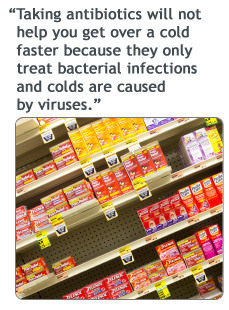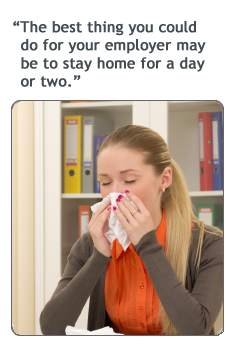 Uh-oh… you have a slight sore throat. You sneezed and you just realized you’re feeling a bit achy. Odds are you coming down with a cold. After all, it’s not unusual, especially this time of year. Overall, the average adult gets three colds per year, each lasting an average of nine days.
Fortunately, there are ways to lower your chances of catching – and spreading – this common malady. If you do get the sniffles, there are strategies to help you feel better, faster.
Is there a surefire way to avoid a cold this winter? The answer to that question is, unfortunately, no. According to Jason Higdon, MD, a primary care physician at Emory’s Patient-Centered Primary Care Clinic in Atlanta, thereisa simple way to lower your risk of catching a cold. Just wash your hands frequently.
“There are hundreds of strains of viruses that cause what’s known as ‘the common cold’ and most of these are transmitted most efficiently by direct contact (touching an infected person or contaminated surface),” Dr. Higdon tells Synergy. That makes hand washing (especially after you’ve been out and about in public or exposed to people in your home or office who have colds) an effective way to minimize your exposure to cold germs.
While direct contact is the primary way you “pick up” cold viruses, some are transmitted by droplets from coughing or sneezing. However, there’s nothing much you can do about that except try to avoid being around people who are coughing and sneezing. In fact, Dr. Higdon explains, when researchers conducted studies to see if wearing face masks for cold prevention worked, the masks failed to show any benefit at all.
 What about natural remedies, such as vitamin C, zinc and the herb Echinacea, which have been touted as cold preventatives? ”With the exception of vitamin C, which may be of some benefit if taken every day, there is a lack of solid evidence that any of these are effective,” says Dr. Higdon , who is an Instructor of Medicine at the Emory University School of Medicine. “Again, the best advice for prevention is to practice good hand hygiene, especially if you are in close contact to someone with a cold.”
Ways to feel better, faster, when you do get a cold Sooner or later, we all come down the sniffles. Is there anything that helps you get over a cold faster?
“Most colds pass in three to five days but staying well hydrated (drinking lots of water, juice and other fluids) and getting plenty of rest may lead you to a speedier recovery,” Dr. Higdon says. “Taking antibiotics will not help you get over a cold faster because they only treat bacterial infections and colds are caused by viruses.”
For symptom relief, the cold remedy long served up by countless moms and grandmas – homemade chicken soup – can actually help. According to the Mayo Clinic, chicken soup may be soothing because of its possible anti-inflammatory and mucus-thinning effects.
Most people turn to over-the-counter medications for colds. There are dozens to choose from and Dr. Higdon says most of them contain a variation of these ingredients:
- Pain relievers (usually acetaminophen or ibuprofen)
- Cough suppressant (dextromethorphan, often listed as DM)
- Decongestant (phenylephrine)
- Expectorant/mucolytic to help expel thick mucus (guaifenesin)
“You can get all of these separately or look for combination medicines based on your symptoms. An example is Robitussin Cold and Cough which has a cough suppressant, expectorant, and decongestant,” Dr. Higdon tells Synergy.
“I recommend checking with your pharmacist if you are unsure how these medicines might affect other medications you take or your health conditions,” he continues. “For example, if you’re a diabetic, you should look for a diabetic cough syrup. And if you have high blood pressure, you should avoid decongestants unless instructed by your doctor.”
 Why colds on the job matter When you come down with a cold and don’t want to get behind at work, you may decide to tough it out and go into the office. While it may seem admirable to work when you don’t feel well, the best thing you could do for your employer may be to stay home for a day or two to reduce the chances of making co-workers sick.
Sure, colds are minor illnesses but research shows colds cause major health-related productivity losses. Consider these workplace-and-colds facts:
- Nearly one-fifth of working adults will experience a cold each year. In fact, 20 to 70 million workdays are missed annually because of colds.
- The cost of lost productivity due to the common cold is approximately $25 billion a year ($16.6 billion of this is attributed to on-the-job productivity loss).
- Try to take a few days off when you have a cold. If you feel well enough to work, ask your manager if you can telecommute for short while. That way you’ll avoid spreading your cold.
“You may still shed virus for up to 14 days. But your risk of infecting others peaks with your symptoms, which is usually on the second or third day of the cold,” Dr. Higdon explains.
“If you have to go to work, the best thing to do is wash your hands on a regular basis. Using medicines to reduce your symptoms, especially if you’re coughing or sneezing, may help keep you from contaminating surfaces such as door handles which others will touch,” he adds. “If you cough or sneeze, do so into the bend of your arm instead of your hand.”
When a cold is more than a cold How do you know if your symptoms suggest your cold may be more than a simple cold – maybe it’s actually the flu or a sinus infection? And when should you see your doctor?
“Colds may cause a low grade fever,” Dr. Higdon answers. “There’s no hard and fast rule but, if you have a temperature above 102 F, then you likely have something more than a cold.”
You may have some minor achiness with colds but body-wide muscle aches are a common feature of the flu, along with a high fever, he adds. A sinus infection, which can produce severe sinus pain, may follow a cold. Although most often due to a virus, sinus infections may be caused by a bacterial infection which can be treated with antibiotics.
The bottom line, Dr. Higdon explains, is this: If your symptoms aren’t improving after five to seven days, or if you abruptly start to feel worse after already being sick for three to four days, it’s time to call your doctor.
|